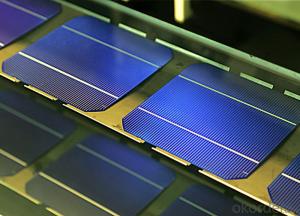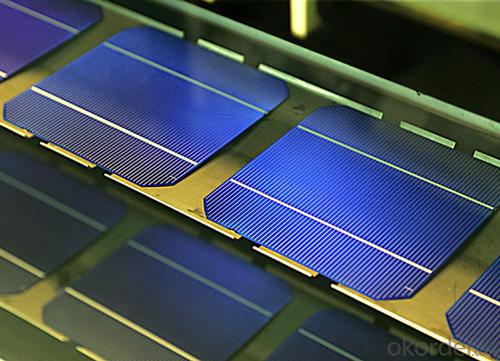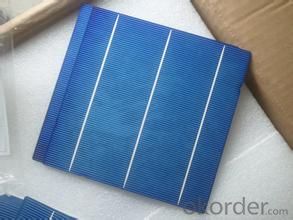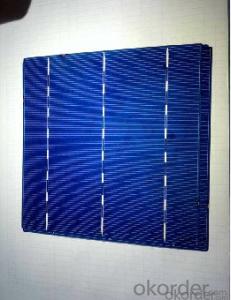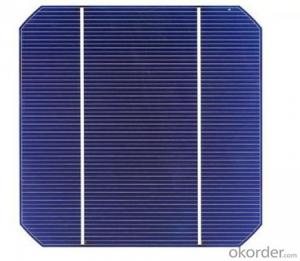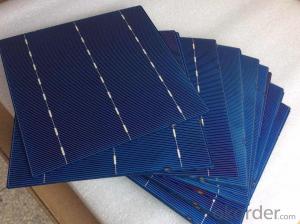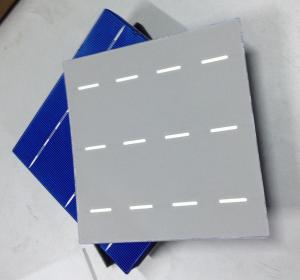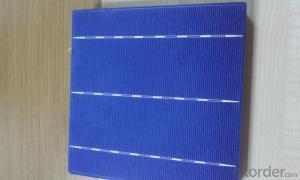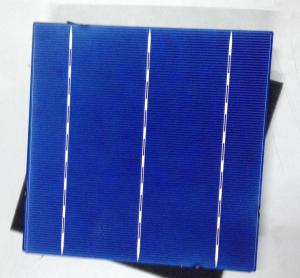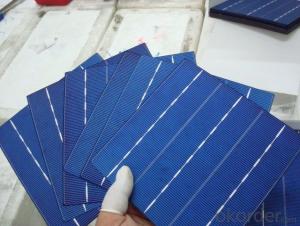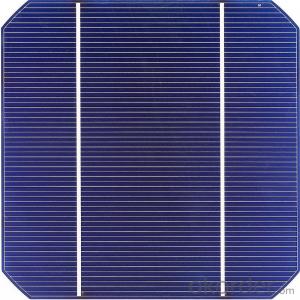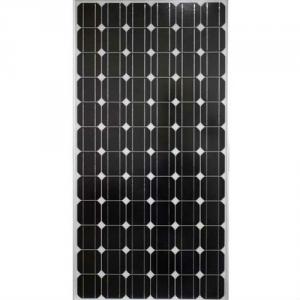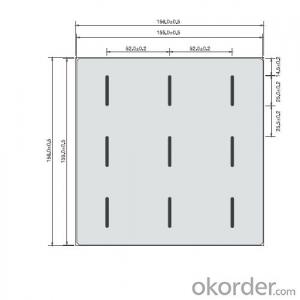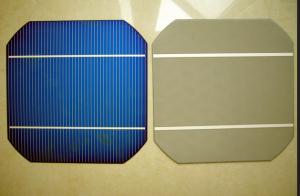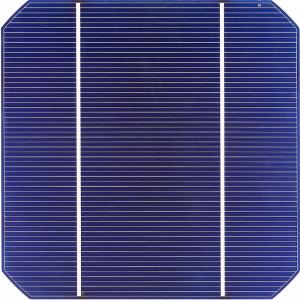Graphene Based Polycrystalline Solar Cells - Tire 1 Manufacturer in China - 17.00%
- Loading Port:
- Shanghai
- Payment Terms:
- TT OR LC
- Min Order Qty:
- 10000 watt
- Supply Capability:
- 500000 watt/month
OKorder Service Pledge
OKorder Financial Service
You Might Also Like
Brief Introduction of Solar Cells
A solar cell, is an electrical device that converts the energy of light directly into electricity by the photovoltaic effect, which is a physical and chemical phenomenon. It is a form of photoelectric cell, defined as a device whose electrical characteristics, such as current, voltage, or resistance, vary when exposed to light. Solar cells are the building blocks of photovoltaic modules, otherwise known as solar panels.
Specifications of Polycrystalline Solar Cells
Format : 156 mm × 156 mm ± 0.5 mm
Thickness: 210 μm ±40 μm
Front (-) : 1.5mm bus bars (silver),blue anti-reflection coating (silicon nitride)
Back (+) : 2.5mm wide soldering pads (silver) back surface field (aluminium)
Efficiency (%) | Pmpp (W) | Umpp (V) | Impp (A) | Voc (V) | Isc (A) |
18.00% | 4.38 | 0.528 | 8.291 | 0.631 | 8.869 |
17.80% | 4.33 | 0.525 | 8.252 | 0.629 | 8.821 |
17.60% | 4.29 | 0.532 | 8.053 | 0.633 | 8.541 |
17.40% | 4.23 | 0.528 | 8.092 | 0.624 | 8.632 |
17.20% | 4.19 | 0.524 | 7.992 | 0.62 | 8.458 |
17.00% | 4.14 | 0.52 | 7.972 | 0.623 | 8.5 |
Advantage of Polycrystalline Solar Cells
1. Tire-1 Solar Cells’ Manufacturer Quality Guarantee. With a complete and sophisticated quality government system, our Quality Management have arrived world’s leading place. Customer can receive Tire-1 Cells Maker’s Quality Standard Products.
2. Trusted Warranty. We can supply trusted after-sales service to our customer. If our cells are found not in conformity to the specification of manufacturer, or should the inspected quantity found in shortage, or should the packing found damaged, the buyer has the right to claim to the seller. The claim, if any, should be presented to seller within 30 days after cargo's arrival date to the port, together with related inspection report and photos issued and provided by a reputable independent surveyor such as SGS.
3. World’s Leading Manufacturer Equipment. We imported the newest and leading production equipment from abroad. Advanced equipment can guarantee the stable quality of cells. Auto production line can also save labor cost which will further cut our production cost.
4. Bulk supply: With the production capacity of 500MW, we can produce large quantity every month. This can satisfy most customer requirement.
Usage of Polycrystalline Solar Cells
Solar cells are often electrically connected and encapsulated as a module. Photovoltaic modules often have a sheet of glass on the front (sun up) side, allowing light to pass while protecting the semiconductor wafers from abrasion and impact due to wind-driven debris, rain, hail, etc. Solar cells are also usually connected in series in modules, creating an additive voltage. Connecting cells in parallel will yield a higher current; our solar cells have passed IEC Certification. With high and stable quality, our cells can greatly improve the performance of Solar Modules.
Applications of Polycrystalline Solar Cells
Assemblies of photovoltaic cells are used to make solar modules which generate electrical power from sunlight, as distinguished from a "solar module" or "solar panel". A solar array generates solar power using solar energy.
Packaging & Delivery of Polycrystalline Solar Cells
Carton Box Package and Deliver by air. It should be noticed that it should be avoid of water, sunshine and moist.
Factory Picture of Solar Cells
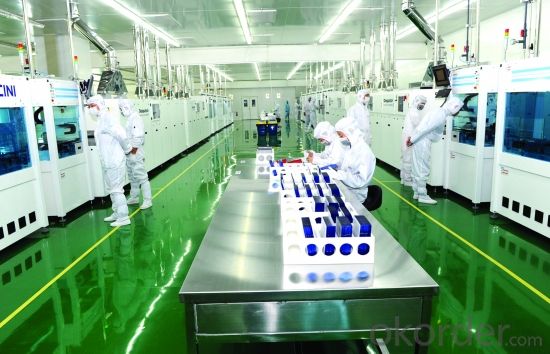
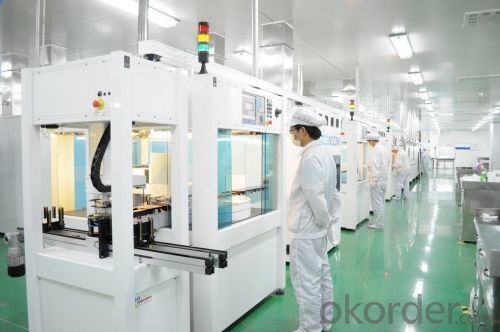
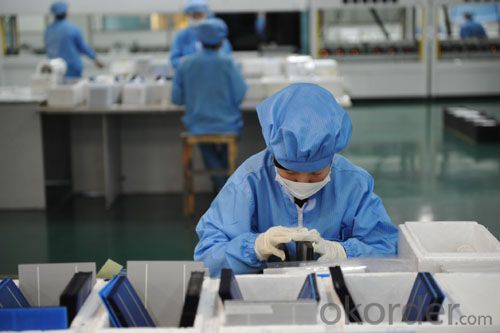
We have organized several common questions for our clients,may help you sincerely:
1. What’s price per watt?
A: It’s depends on the quantity, delivery date and payment terms of the order. We can talk further about the detail price issue. Our products is high quality with lower price level.
2. Can you tell me the parameter of your solar cells?
We have different series of cells with different power output, both from c-si to a-si. Please take our specification sheet for your reference.
3. How do you pack your products?
We have rich experience on how to pack the panels to make sure the safety on shipment when it arrives at the destination.
4. Can you do OEM for us?
Yes, we can.
5. How long can we receive the product after purchase?
In the purchase of product within three working days, We will arrange the factory delivery as soon as possible. The perfect time of receiving is related to the state and position of customers. Commonly 7 to 10 working days can be served.
- Q: Can solar cells be used for off-grid power supply?
- Yes, solar cells can be used for off-grid power supply. Solar cells, also known as photovoltaic cells, convert sunlight into electricity. These cells can be used to generate electricity in remote areas or locations where the traditional power grid is unavailable or unreliable. Solar panels can be installed on rooftops or in open spaces to capture sunlight and produce electricity, which can then be stored in batteries for use during non-sunlight hours or when needed. This makes solar cells an efficient and sustainable solution for off-grid power supply.
- Q: What is the impact of electromagnetic interference on solar cell performance?
- Electromagnetic interference can have a significant impact on solar cell performance. It can disrupt the normal operation of solar cells by introducing unwanted electrical signals that interfere with the proper functioning of the cells. This interference can lead to decreased efficiency and power output of the solar panels, as well as potential damage to the cells themselves. Therefore, it is crucial to minimize electromagnetic interference to ensure optimal performance and longevity of solar cells.
- Q: Are solar cells durable?
- Yes, solar cells are generally durable. They are designed to withstand various environmental conditions such as heat, humidity, and extreme temperatures. Additionally, most solar cells are made with materials that have a long lifespan and are resistant to degradation. However, proper maintenance and protection are necessary to ensure their longevity.
- Q: How do solar cells perform in coastal areas?
- Solar cells can perform well in coastal areas as they can harness sunlight effectively, even in regions with high humidity and salt exposure. However, the presence of saltwater and corrosive elements may require additional maintenance and cleaning to ensure optimal performance and longevity of the solar panels.
- Q: Can solar cells be installed on sloped surfaces?
- Yes, solar cells can be installed on sloped surfaces. In fact, solar panels are commonly installed on sloped rooftops to harness sunlight efficiently. However, the angle of the slope may affect the overall energy output, so it is important to consider the optimal tilt and orientation of the solar panels for maximum efficiency.
- Q: Can solar cells be used in security systems?
- Yes, solar cells can be used in security systems. Solar-powered security systems utilize solar cells to convert sunlight into electricity, which is then stored in batteries for continuous power supply. This allows security systems to operate independently of the electrical grid, making them more reliable and cost-effective in remote or off-grid locations. Additionally, solar-powered security systems are environmentally friendly, reducing dependence on fossil fuels and lowering carbon emissions.
- Q: Can solar cells be used in water heating systems?
- Yes, solar cells can be used in water heating systems. Solar water heating systems use solar thermal collectors, which consist of solar cells that convert sunlight into electricity. This electricity is then used to heat water, making it a sustainable and environmentally friendly option for water heating.
- Q: Can solar cells be used to power electric vehicles?
- Yes, solar cells can be used to power electric vehicles. Solar panels can be installed on the roof or body of an electric vehicle to capture sunlight and convert it into electricity, which can then be used to charge the vehicle's batteries. This allows the vehicle to be partially or fully powered by solar energy, reducing reliance on traditional charging methods and promoting sustainability. However, the efficiency of solar cells and the limited surface area available on vehicles may currently limit their ability to solely power electric vehicles, but they can certainly contribute to extending their range and reducing their carbon footprint.
- Q: Can solar cells be used for powering desalination plants?
- Yes, solar cells can be used for powering desalination plants. Solar energy can be converted into electricity through solar cells, which can then be used to power the various processes involved in desalination, such as pumping water, filtering, and removing salt. This renewable energy source offers a sustainable and environmentally friendly solution for powering desalination plants, reducing the reliance on fossil fuels and minimizing carbon emissions.
- Q: What is the right way to operate a solar cell?
- It is difficult to operate the solar cell because it is high technology related.
Send your message to us
Graphene Based Polycrystalline Solar Cells - Tire 1 Manufacturer in China - 17.00%
- Loading Port:
- Shanghai
- Payment Terms:
- TT OR LC
- Min Order Qty:
- 10000 watt
- Supply Capability:
- 500000 watt/month
OKorder Service Pledge
OKorder Financial Service
Similar products
Hot products
Hot Searches
Related keywords
